Royal Life Guards (Denmark)
The Royal Life Guards (Danish: Den Kongelige Livgarde) is a mechanized infantry regiment of the Danish Army, founded in 1658 by King Frederik III. The primary task is to provide a number of soldiers from the Guard Company to serve as a guard/ceremonial unit to the Danish monarchy, while training the Royal Guards for various functions in the mobilisation force.[1] Until its disbandment, the Royal Horse Guards (Livgarden til Hest), served the role as the mounted guard/ceremonial unit, afterwards the role was taken over by Guard Hussar Regiment Mounted Squadron. During the time period 1684-1867, the Royal Life Guards were called The Royal Foot Guard (Den Kongelige Livgarde til Fods), in order to distinguish between the regiment and the Royal Horse Guards.[2]
| The Royal Life Guard | |
|---|---|
| Den Kongelige Livgarde | |
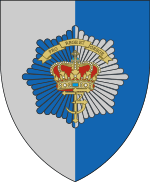 Coat of arms | |
| Active | 30 June 1658 – present (361 years, 11 months) |
| Country | |
| Branch | |
| Type | Foot Guards |
| Role | 1st Battalion – Mechanized infantry 2nd Battalion – Mechanized infantry 3rd Battalion – Training Guards Company – Public Duties |
| Size | Three battalions & one company |
| Part of | Army Staff |
| Garrison/HQ | Høvelte Rosenborg Castle |
| Nickname(s) | Livgarden, Garden |
| Motto(s) | Pro Rege et Grege (For King and people) |
| Engagements | Northern Wars Scanian War Great Northern War Napoleonic Wars First War of Schleswig Second War of Schleswig Operation Weserübung War in Afghanistan (2001–present) Post-invasion Iraq, 2003–2011 Operation Inherent Resolve Resolute Support Mission |
| Website | Official website |
| Commanders | |
| Current commander | Colonel Mads Rahbek |
| Chief of the Guard Company | Major S.P. Østergaard |
| Notable commanders | Duke William of Württemberg Christian X of Denmark Alexander III of Russia |
| Insignia | |
| Cap Badge of the Royal Danish Guard |  |
| Regimental belt | |
| Colours |  |
Organisation

The regiment itself has two battalions, the Guard Company and a Musical Corps:








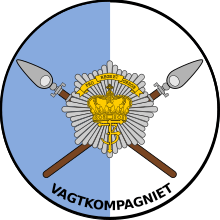
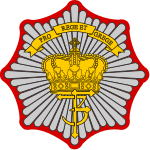
- Disbanded units


- 5th Battalion – Founded 2001, Disbanded 2005. Infantry Battalion. (Merged in from Danish Life Regiment, only as reserve)
- 6th Battalion – Founded 2001, Disbanded 2005. Infantry Battalion. (Merged in from Danish Life Regiment, only as reserve)
- 7th Battalion – Founded 2001, Disbanded 2005. Infantry Battalion. (Merged in from Zealand Life Regiment, only as reserve)
Guard Company
Guard duties
The Royal Life Guards provide a permanent guard at the Amalienborg Palace, Kastellet (part of the old fortification of Copenhagen), Rosenborg Castle/garrison of the Royal Life Guards in Copenhagen and the garrison of Høvelte. On occasions guard is kept at Fredensborg Palace, Marselisborg Palace, Gråsten Palace, Christiansborg Palace and other locations inside the Danish realm.
Uniform
The review order uniform of the Royal Life Guards, worn while they are on guard duty, consists of bearskin headdresses, dark blue tunics and light blue trousers with white stripes. The ceremonial uniform, worn on special state occasions, substitutes a scarlet tunic for the dark blue.[3] The bearskin dates from 1803 and is decorated with the regiment's bronze cap badge (the Sun and Royal Coat of Arms).[4] Symbolic infantry sabers are carried by the rank and file. These were part of the spoils from the First Schleswig War of 1848–1851 and were originally derived from a French infantry weapon.
Names of the regiment
| Hans kongelige Majestæts Livregiment | His Royal Majesty's Life Regiment | 1658 | – | 1684 |
| Vor Garde til Fods | Our Guard on Foot | 1684 | – | 1763 |
| Den kongelige Livgarde til Fods | Royal Life Guard on Foot | 1763 | – | 1867 |
| Livgarden | Life Guard | 1867 | – | 1961 |
| Den kongelige Livgarde | Royal Life Guard | 1961 | – | Present |
Alliances


Image gallery
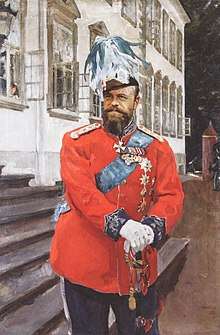
Alexander III in Danish Royal Life Guards Uniform, 1899 - Royal Guards on Queen Margrethe II's Birthday, 16 April 2009.
_02.jpg) Royal Guard at the Amalienborg Palace, Copenhagen.
Royal Guard at the Amalienborg Palace, Copenhagen. Danish Royal Guards presenting arms at the Changing of the Guard ceremony, Amalienborg.
Danish Royal Guards presenting arms at the Changing of the Guard ceremony, Amalienborg.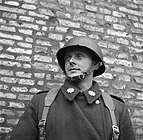 Royal Life Guards in old combat uniform
Royal Life Guards in old combat uniform Royal Life Guard in combat uniform (m/84)
Royal Life Guard in combat uniform (m/84)
staff company/1st battalion.
See also
Further reading
- Brammer, G. (1908). Livgarden 1658-1908 (in Danish). Copenhagen.
- Gram-Andersen, J. (1983). Den Kongelige Livgarde 325 år - perioden 1958-1983 (in Danish). Copenhagen.
- Gram-Andersen, J. (1986). Livgardens Kaserne & Rosenborg Eksercerplads 200 år (in Danish). Copenhagen.
- Lövenskiold, C.L.v (1858). Efterretninger om Den Kongelige Livgarde til Fods (in Danish). Copenhagen.
- Thaulow, Th. (1933). Livgarden 1908-1933 (in Danish). Copenhagen.
- Thaulow, Th.; Mentze, E.; Friis Møller, M., eds. (1958). Livgarden gennem 300 år (in Danish). Copenhagen.
References
- Værnsfælles Forsvarskommando (11 September 2018). "Om Den Kongelige Livgarde". forsvaret.dk (in Danish). Danish Defence. Retrieved 28 September 2018.
- Værnsfælles Forsvarskommando (18 December 2016). "Livgardens historie". forsvaret.dk (in Danish). Danish Defence. Retrieved 28 September 2018.
- Rinaldo D. D'Ami, page 83 "World Uniforms in Colour" Vol. 1, SBN 85059 031 0
- Rinaldo D. D'Ami, page 84 "World Uniforms in Colour" Vol. 1, SBN 85059 031 0
- Laursen, Ole (22 April 2014). "Historical Overview of Royal Life Guards". Wadschier. Retrieved 5 June 2017.
External links
| Wikimedia Commons has media related to The Royal Life Guards in Denmark. |